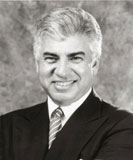Richard Ben-Veniste
Richard Ben-Veniste | |
|---|---|
 | |
| Born | January 3, 1943 |
| Education | A.B. (1964), LL.B. (1967), LL.M. (1968) |
| Alma mater | Muhlenberg College, Columbia Law School, Northwestern University School of Law |
| Occupation | Attorney |
| Employer | Mayer Brown LLP |
| Known for | Watergate prosecutor; Senate Whitewater Committee Chief Counsel (Minority); Member, 9/11 Commission |
| Title | Partner |
| Political party | Democratic Party |
| Awards | The Best Lawyers in America, 1983-2010. Washingtonian Magazine's Top Lawyers in Washington, DC, 1992-2010. LL.D. (honorary), Muhlenberg College, 1975. |
| Notes | |
Richard Ben-Veniste (born January 3, 1943) is an American lawyer. He first rose to prominence as a special prosecutor during the Watergate scandal. He has also been a member of the 9/11 Commission. He is known for his pointed questions and criticisms of members of both the Clinton[citation needed] and George W. Bush administrations. In 2017, he became a CNN Legal Analyst.[4]
Career
Ben-Veniste was born to a Jewish family, his father of Levantine origin and his mother of Russian and German origin.[5] He graduated from Stuyvesant High School in New York City (1960),[6] earned an A.B. from Muhlenberg College in Allentown, Pennsylvania (1964), an LL.B. from Columbia Law School in New York City (1967), and an LL.M. from Northwestern University School of Law in Chicago, Illinois (1968).
He was an assistant U.S. attorney (1968–1973) in the Southern District of New York, and chief of the Special Prosecutions section, (1971–1973). He became a leading Watergate prosecutor, as chief of the Watergate Task Force of the Watergate Special Prosecutor's Office, (1973–1975).
He was the Democrats' chief counsel (1995–1996)[2] on the Senate Whitewater Committee which investigated a variety of allegations involving Bill and Hillary Clinton. He argued effectively[according to whom?] that the Clintons did no wrong in connection with their investment in a failed land development project named Whitewater, or in their other Arkansas business affairs, nor did they commit violations of law after Mr. Clinton became president.
Ben-Veniste was a presidential appointee (2000) to the Nazi War Crimes and Japanese Imperial Government Records Interagency Working Group, which ultimately declassified some 8 million documents relating to war crimes in the World War II and post-war era.
9/11 Commission
Ben-Veniste was a member (2002) of the National Commission on Terrorist Attacks Upon the United States (or "9/11 Commission"), where he developed a reputation for asking tough questions and demanding access to sensitive documents, although in some circles he was accused of grandstanding.[7] His interrogation of U.S. Secretary of State Condoleezza Rice was contentious, and led to the declassification of the previously secret August 6, 2001, President's Daily Brief: "Bin Laden Determined to Attack Inside the United States." The 9/11 Commission's report was published in 2004 and has been read by millions of readers worldwide. Most of the commission's recommendations have been enacted into law.[citation needed]
Ben-Veniste was a partner of the Washington, D.C., law firm of Melrod, Redman & Gartlan (1975–1981). In 1981 he formed Ben-Veniste and Shennoff, where he practiced for 10 years. He joined Weil, Gotshal and Manges in 1991, where he was a partner until 2002. Ben-Veniste has been a partner at Mayer Brown LLP from 2002 until the present.[2][3][8]
Works
- Richard Ben-Veniste and George Frampton, Stonewall: The Real Story of the Watergate Prosecution Simon & Schuster, 1977, ISBN 0-671-22463-8
- Richard Ben-Veniste, The Emperor's New Clothes: Exposing the Truth from Watergate to 9/11 Thomas Dunne Books, 2009, ISBN 978-0-312-35796-2
References
- ^
Brozan, Nadine (November 28, 1997). "CHRONICLE". New York Times. p. D8. Retrieved May 2, 2009.
Today, there are 1,500 Jews in Salonika and Mr. Ben-Veniste met a distant relative among them, the grandson of my grandfather's half-brother, he said. It was a wonderful discovery.
{{cite news}}: Cite has empty unknown parameters:|pmd=and|curly=(help) - ^ a b c Contemporary Authors Online, Gale, 2003. Entry Updated : 12/10/2003. Document Number: H1000007672 http://galenet.galegroup.com/servlet/BioRC. Fee via Fairfax County Public Library, accessed 2009-05-02. Reproduced in Biography Resource Center. Farmington Hills, Michigan: Gale, 2009.
- ^ a b "Richard Ben-Veniste." Biography Resource Center Online. Gale, 2004. Reproduced in Biography Resource Center. Farmington Hills, Mich.: Gale, 2009. http://galenet.galegroup.com/servlet/BioRC Document Number: K1650004142. Fee via Fairfax County Public Library, accessed May 2, 2009.
- ^ Stephen Collinson (June 19, 2017). "Trump defiant as pressure grows". CNN. Retrieved August 10, 2017.
- ^ Radar Marcus, Jacob (January 1, 1990). United States Jewry, 1776-1985, Volumes 1-2. Wayne State University Press. p. 186. ISBN 9780814321867.
- ^ Hartocollis, Anemona (June 15, 2002). "Lead Levels At School Are Linked To Sept. 11". New York Times. Retrieved November 2, 2007.
- ^ Chotiner, Isaac (May 24, 2009). "Book Review: 'The Emperor's New Clothes' by Richard Ben-Veniste". Retrieved July 19, 2017 – via WashingtonPost.com.
- ^ Mayer Brown - Richard Ben-Veniste firm biography
Further reading
- New York Times, November 13, 1973.
- Washington Post Book World, April 17, 1977.
- Daily Standard, April 15, 2004.
- Insight on the News, April 29, 1996.
- Los Angeles Times, April 11, 2004.
- Newsweek, June 10, 1996.
- New York Times, April 18, 2004.
- Washington Post, December 8, 1998.
- Washington Post Magazine, July 26, 1981.
- Weekly Standard, April 21, 1997.
External links
- Living people
- 1943 births
- Columbia Law School alumni
- Northwestern University Pritzker School of Law alumni
- Stuyvesant High School alumni
- Muhlenberg College alumni
- Lawyers from Washington, D.C.
- New York (state) lawyers
- American prosecutors
- 21st-century Sephardi Jews
- United States Senate lawyers
- Washington, D.C. Democrats
- New York (state) Democrats
- Whitewater controversy
- Watergate scandal investigators
- CNN people

